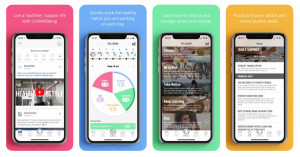It is normal to feel anxious when starting something new, like a university course, and everyone feels stress at difficult times of the year like exam periods or when there is a lot happening in their lives. It can sometimes be hard to relax. This activity is about helping you to manage these feelings and includes tips from other autistic students.
Background

Students in the Autism&Uni surveys said they found these things stressful at university:
- Choosing the right subject to study
- Group work
- Sudden changes to timetables and assignments (speak to your lecturer or tutor about how these affect you)
- Exams
- Not getting the support they needed (see Needs Assessment article)
- Noisy classrooms and lecture theatres
- Not liking where they live
- Sensory issues
- Getting lower marks than they hoped for
- Travelling to and from university
- Fitting in (see Talking about your autism article)
- Making presentations and talking in public
How could this affect me?
Other people on your course will probably be struggling with many of the same issues (hopefully not all at the same time!). As autistic people tend to have higher levels of anxiety than other adults, it’s important to know how to deal with these feelings (alongside other forms of support like therapy, counselling and medication where appropriate) so that they don’t become overwhelming.
Hopefully you will have been able to access support at university and have other people you trust to talk to when you are finding things difficult, like friends, family members and professionals. However, it’s a good idea to have places where you can go and activities you feel comfortable doing yourself when you feel overloaded and stressed.
What to do next?
Try out some of the activities below
Practical tips
Why not download the free Falmouth/Exeter Uni Wellbeing App? (Available for iOS and Android. ) It has guidance on living a happier, healthier life at university and has podcasts and tools for reducing stress and anxiety and managing your finances.

These activities were popular with the students and graduates in our surveys for reducing stress:
- Exercise/sport
- Music
- Art
- Meditation and mindfulness
- Favourite food and drink
- Chatting with family and friends
- Mentoring
- Talking to lecturers and tutors
Here’s what some of the students and graduates had to say about other things that helped them:
- “Craft is relaxing, also being prepared for situations.”
- “My support worker helps me calm down.”
- “Drawing in my notebooks.”
- “Chatting in an online forum with other neurodiverse students.”
- “Focusing on the causes of the situation.”
- “Some friends called the ‘Mental Wing’ were incredibly supportive.”
- “Throwing myself into union activities: attending meetings, planning events, helping with campaigns.”
- “Email contact with my tutor. Face to face I would have been reluctant to arrange or attend.”
- “Getting away from horrible food in the residences.”
- “Clubbing :-)”
It’s also really useful to have places where you can go if you feel overloaded or need to relax – several students said quiet places were really important to them. Here’s where they say they go:
- The library (see how the Library can help you)
- The gym or pool (very popular)
- Student Union building
- Outside for a walk
- Green space around campus
- Quiet study rooms
- Coffee shop
- Computer rooms
- Back to their room
- Disability service
- Drinks machine
Questions to think about
- What do you like to do at home that makes you feel relaxed?
- What food and drink makes you feel better? Can you make sure you have some with you?
- Who can you talk to?
- What do your lecturers and tutors know about how your autism affects you?
- Where can you go if you feel stressed out? Make a list of places.
- What is your favourite form of exercise? Even non-sporty people can usually find something they enjoy.
Additional information and links
https://www.youtube.com/watch?v=IqcOqh9_ivI
Useful links
The Wellbeing Team and the Chaplaincy Team in Student and Academic Services
Mind tips for coping with student life


 Back
Back